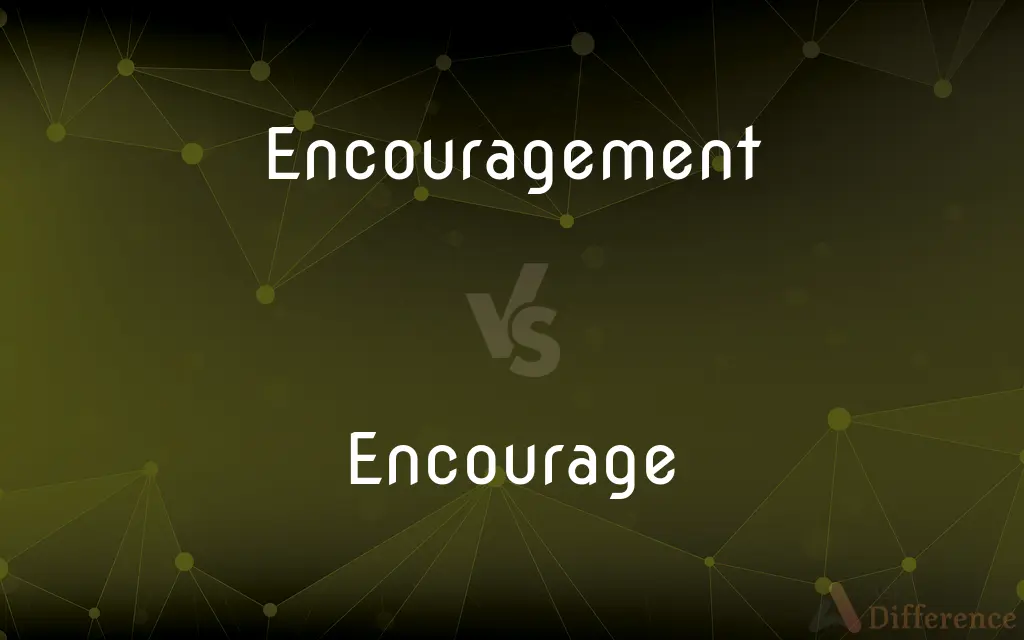Encouragement vs. Encourage — What's the Difference?
Edited by Tayyaba Rehman — By Fiza Rafique — Updated on April 1, 2024
Encouragement is the act of giving support or confidence, while encourage is the verb form that describes the action of providing this support.

Difference Between Encouragement and Encourage
Table of Contents
ADVERTISEMENT
Key Differences
Encouragement refers to the support, confidence, or hope given to someone, often aimed at boosting their morale or aiding their progress in some endeavor. On the other hand, encourage is the action of giving encouragement. It involves any gesture or words that help to uplift someone’s spirit or improve their performance.
Encouragement is typically seen as a noun, representing the concept or instance of providing support. Whereas, encourage is used as a verb, indicating the act of offering encouragement to someone. This distinction highlights the difference between the abstract concept of support and the direct action of providing it.
Encouragement can come in many forms, such as praise, recognition, or tangible help. It aims to positively affect someone's attitude or behavior. Encourage, however, focuses on the process of actively engaging in behaviors or speech that lead to encouragement.
Encouragement often has a lasting impact, creating a supportive atmosphere that can lead to improved confidence or success. Encourage, by its nature, is a momentary action that contributes to the buildup of encouragement over time.
Encouragement is something one can receive, offer, or observe in various contexts, emphasizing its role as a component of interpersonal interactions. Encourage embodies the proactive steps one takes to create or enhance a situation of encouragement, showcasing the dynamic aspect of encouragement.
ADVERTISEMENT
Comparison Chart
Part of Speech
Noun
Verb
Definition
The act of giving support, confidence, or hope
To give support, confidence, or hope to someone
Usage Context
Refers to the instance or concept of support
Describes the action of providing support
Impact
Can be long-lasting, creating a supportive atmosphere
Momentary action, contributes to encouragement over time
Examples
"Her words of encouragement made a difference."
"He encouraged his friend to apply for the job."
Compare with Definitions
Encouragement
Support or confidence given to someone.
The team's encouragement helped her overcome her fears.
Encourage
To instill someone with the courage or confidence to do something.
They encourage each other in times of hardship.
Encouragement
A form of positive reinforcement.
Encouragement from peers often leads to improved performance.
Encourage
To motivate someone to proceed or to act.
She encouraged her brother to pursue his dreams.
Encouragement
The process of stimulating someone to develop.
Through constant encouragement, she gained the skills needed for her role.
Encourage
To support or foster growth.
The program encourages creativity among students.
Encouragement
Something that boosts someone's morale.
Words of encouragement can be very powerful in difficult times.
Encourage
To advocate or promote a particular behavior or action.
The campaign encourages healthy eating habits.
Encouragement
The act of motivating someone to continue or to attempt something.
His encouragement was crucial in her decision to start a new project.
Encourage
To contribute to the progress or growth of something.
His mentorship encouraged a new generation of scientists.
Encouragement
The act of encouraging.
Encourage
To inspire with hope, courage, or confidence.
Encouragement
The state of being encouraged.
Encourage
To give support to; foster
Policies designed to encourage private investment.
Encouragement
One that encourages.
Encourage
To stimulate; spur
Burning the field to encourage new plant growth.
Encouragement
The act of encouraging
Encourage
To mentally support; to motivate, give courage, hope or spirit.
I encouraged him during his race.
Delia's coach encouraged her to focus on the positives.
Encouragement
Something that incites, supports, promotes, protects or advances; incentive
Encourage
To spur on, strongly recommend.
We encourage the use of bicycles in the town centre.
We encourage you to cycle instead of taking the car.
Encouragement
Words or actions that increase someone's confidence
Encourage
To foster, give help or patronage
The royal family has always encouraged the arts in word and deed.
Encouragement
The feeling of being encouraged
Encourage
To give courage to; to inspire with courage, spirit, or hope; to raise, or to increase, the confidence of; to animate; enhearten; to incite; to help forward; - the opposite of discourage.
David encouraged himself in the Lord.
Encouragement
The act of encouraging; incitement to action or to practice; as, the encouragement of youth in generosity.
All generous encouragement of arts.
Encourage
Contribute to the progress or growth of;
I am promoting the use of computers in the classroom
Encouragement
That which serves to incite, support, promote, or advance, as favor, countenance, reward, etc.; incentive; increase of confidence; as, the fine arts find little encouragement among a rude people.
To think of his paternal care,Is a most sweet encouragement to prayer.
Encourage
Inspire with confidence; give hope or courage to
Encouragement
The expression of approval and support
Encourage
Spur on;
His financial success encouraged him to look for a wife
Encouragement
The act of giving hope or support to someone
Encouragement
The feeling of being encouraged
Common Curiosities
How does encouragement affect an individual?
It positively influences an individual’s morale, motivation, and confidence, potentially leading to improved performance or wellbeing.
Is encouragement always verbal?
No, encouragement can also be non-verbal, such as through gestures, actions, or even presence, offering support without words.
Can encouragement be negative?
While encouragement is typically positive, it must be genuine and appropriate to the situation to be effective; otherwise, it can have unintended negative effects.
Why is encouragement important in the workplace?
It fosters a positive environment, boosts morale, and can lead to increased productivity and job satisfaction.
What is encouragement?
Encouragement is the act or process of providing support, confidence, or hope to someone.
What does it mean to encourage someone?
To encourage someone means to support them, boost their morale, or motivate them to continue or undertake a task or challenge.
How can parents encourage their children?
Parents can encourage their children by praising their efforts, supporting their interests, and showing confidence in their abilities.
Does encouragement need to be direct?
Encouragement can be both direct, such as verbal praise, and indirect, such as creating opportunities for success.
How do you encourage someone who is discouraged?
Listening, empathizing, offering positive feedback, and reminding them of their strengths and past successes can help.
What’s the difference between encouragement and praise?
Encouragement focuses on effort and improvement, while praise often highlights achievements or innate abilities.
Can encouragement affect learning?
Yes, encouragement can significantly impact learning by boosting confidence and motivation, leading to better outcomes.
Can self-encouragement be beneficial?
Self-encouragement, or self-motivation, plays a crucial role in achieving goals and overcoming challenges by fostering resilience and perseverance.
How do encouragement and support differ?
While closely related, support often entails providing practical help or resources, whereas encouragement focuses more on emotional and motivational aspects.
How does culture affect encouragement?
Cultural values and norms can influence how encouragement is given and received, as well as what forms of encouragement are considered most appropriate or effective.
Is there a wrong way to encourage someone?
Encouragement that is insincere, overdone, or not aligned with the individual’s needs may not be effective or could even be counterproductive.
Share Your Discovery

Previous Comparison
Courteous vs. Considerate
Next Comparison
Crime vs. DelictAuthor Spotlight
Written by
Fiza RafiqueFiza Rafique is a skilled content writer at AskDifference.com, where she meticulously refines and enhances written pieces. Drawing from her vast editorial expertise, Fiza ensures clarity, accuracy, and precision in every article. Passionate about language, she continually seeks to elevate the quality of content for readers worldwide.
Edited by
Tayyaba RehmanTayyaba Rehman is a distinguished writer, currently serving as a primary contributor to askdifference.com. As a researcher in semantics and etymology, Tayyaba's passion for the complexity of languages and their distinctions has found a perfect home on the platform. Tayyaba delves into the intricacies of language, distinguishing between commonly confused words and phrases, thereby providing clarity for readers worldwide.
















































